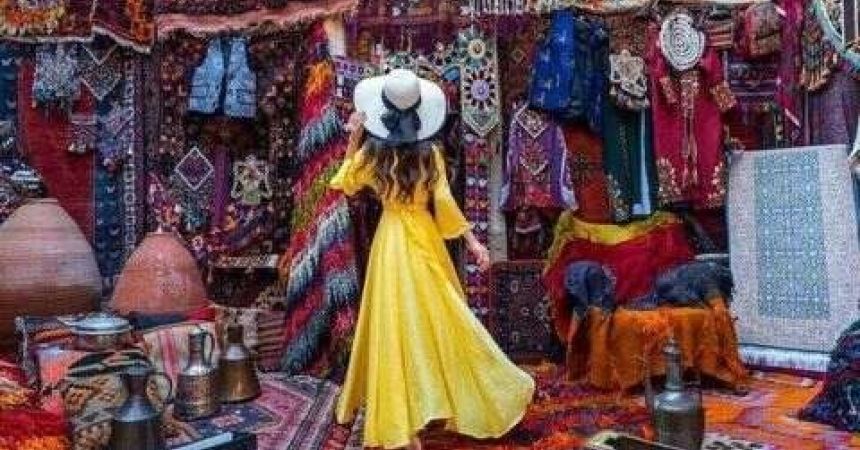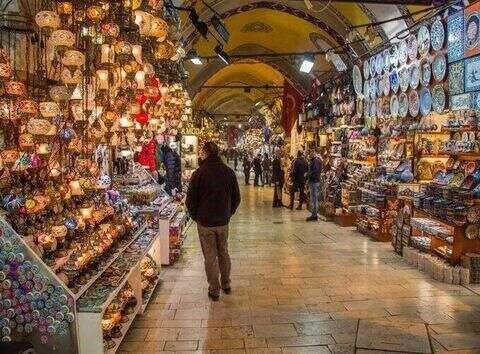
Turkish Souvenirs
Turkey is a land rich in culture, history, and artistry, making it an ideal destination for travelers seeking unique souvenirs to commemorate their adventures. From traditional handicrafts to delicious culinary delights, Turkish souvenirs reflect the country’s diverse heritage and craftsmanship. In this comprehensive guide, we’ll explore some of the most popular and authentic souvenirs you can bring back from Turkey, along with tips on where to find them and how to choose the best quality.
Turkish Carpets and Kilims
Turkish carpets and kilims are world-renowned for their intricate designs, vibrant colors, and exceptional craftsmanship. They represent centuries of weaving tradition and artistry passed down through generations.
Types of Carpets and Kilims
Handwoven Carpets:
These carpets are made using traditional techniques, often taking months or even years to complete. Each carpet tells a story through its patterns and motifs, which may represent specific regions, tribes, or cultural elements.
Kilim:
A flat-weave carpet that is typically lighter and more decorative than traditional carpets. Kilims often feature geometric designs and are versatile, used as rugs, wall hangings, or table covers.
Where to Buy Carpets in Turkey
Grand Bazaar (Kapalıcarsı):
One of the largest and oldest covered markets in the world, the Grand Bazaar in Istanbul is a treasure trove of carpets and kilims. Take your time to explore various shops, compare prices, and admire the craftsmanship.
In Cappadocia:
This region is known for its high-quality carpets. Look for workshops where you can see artisans at work and learn about the weaving process.
Tips for Choosing Carpets and Kilims
- Check the Quality: Look for knots and the density of the weave. Handwoven carpets will have a more intricate design and feel denser than machine-made ones.
- Ask About the Story: Inquire about the origin of the carpet and the symbolism behind its design. Authentic sellers will be happy to share the history and significance of their products.
Turkish Delight (Lokum)
Turkish Delight, or lokum, is a traditional sweet confectionery made from sugar, starch, and flavorings. This treat has been enjoyed for centuries and is often flavored with rosewater, lemon, or nuts.
Varieties of Turkish Delight
- Classic Flavors: The most common flavors include rose, lemon, and pomegranate, often dusted with powdered sugar or desiccated coconut.
- Nuts and Spices: Some varieties include nuts such as pistachios, hazelnuts, or walnuts, while others may have spices like cinnamon or cloves.
Where to Buy Turkish Delight
- Local Confectioneries: Visit local sweet shops in cities like Istanbul, Antalya, and Izmir for a wide selection of lokum.
- Markets: Look for traditional markets where you can sample different flavors before purchasing.
Tips for Buying Turkish Delight
- Sample Before You Buy: Many shops offer samples, so take advantage of this to find your favorite flavors.
- Packaging: If you plan to take lokum home, choose vacuum-sealed packages to maintain freshness.
Hand-Painted Ceramics
Turkish ceramics are known for their vivid colors and intricate designs, often inspired by nature and traditional motifs. From plates and bowls to tiles and vases, these handmade pieces are a beautiful representation of Turkish artistry.
Types of Ceramics in Turkey
- Iznik Tiles: Famous for their beautiful floral patterns, Iznik tiles are often used to adorn mosques and palaces. Small tiles make excellent decorative items for your home.
- Pottery: Look for hand-painted pottery items like dishes, bowls, and mugs, each unique and full of character.
Where to Buy
- Kütahya: This city is known for its pottery and ceramics. Visit local workshops where artisans create beautiful pieces.
- Grand Bazaar: You’ll also find a variety of ceramics in the Grand Bazaar, where you can explore different designs and styles.
Tips for Buying Ceramics
- Check for Authenticity: Look for handmade items, as machine-made ceramics will lack the charm and character of handcrafted pieces.
- Inspect for Quality: Examine the glaze and check for any cracks or imperfections before purchasing.
Evil Eye (Nazar Boncugu)
The evil eye, or nazar boncuğu, is a traditional amulet believed to protect against negative energy and envy. This symbol is ubiquitous in Turkish culture and makes for a meaningful souvenir.
Types of Evil Eye Items
- Jewelry: Evil eye charms are often incorporated into bracelets, necklaces, and earrings, making them fashionable as well as protective.
- Home Decor: You can find evil eye ornaments, wall hangings, and keychains to ward off negativity in your home.
Where to Buy Nazar Boncuk
- Local Markets: You’ll find evil eye items in various markets and souvenir shops throughout Turkey, especially in tourist areas.
- Craftsmen Shops: Look for artisans who create unique evil eye products, ensuring you get an authentic piece.
Tips for Buying Evil Eye Items
- Choose High-Quality Pieces: Look for items made from glass or ceramics, as these materials are traditional for evil eye charms.
- Cultural Significance: Ask about the meaning behind the designs to gain a deeper understanding of the item you’re purchasing.
Spices and Herbs of Turkey
Turkey’s rich culinary heritage is reflected in its vibrant spices and herbs. Bringing home Turkish spices allows you to recreate the flavors of your travels and adds a unique touch to your cooking.
Popular Spices in Turkey
- Sumac: A tangy spice often used in salads and grilled meats.
- Pul Biber: A type of crushed red pepper that adds heat to dishes.
- Mint: Dried mint is commonly used in Turkish tea and as a seasoning for various dishes.
Where to Buy
- Spice Bazaar (Visit Egyptian Bazaar): Located in Istanbul, the Spice Bazaar is a feast for the senses, filled with stalls selling a wide variety of spices, herbs, and teas.
- Local Markets: Many towns and cities have local markets where you can find fresh spices and herbs.
Tips for Buying Spices
- Buy in Small Quantities: Since spices can lose their potency over time, purchase smaller amounts to ensure freshness.
- Sample Before You Buy: Many vendors allow you to taste their spices, helping you choose the ones you prefer.

Traditional Textiles: Shawls, Scarves, and Towels
Turkey is known for its beautiful textiles, including handwoven shawls, scarves, and towels. These items often feature intricate patterns and vibrant colors, making them perfect souvenirs.
Types of Textiles
- Pestemal: A traditional Turkish towel, pestemal is lightweight and absorbent, making it perfect for the beach or bath. They often come in beautiful patterns and colors.
- Silk Scarves: Handwoven silk scarves are a luxurious souvenir, showcasing intricate designs and craftsmanship.
Where to Buy
- Grand Bazaar: Explore the many textile shops in the Grand Bazaar for a wide selection of shawls and towels.
- Local Artisan Shops: Look for shops that specialize in handmade textiles to ensure authenticity.
Tips for Buying Textiles in Turkey
- Feel the Material: Check the softness and quality of the fabric before purchasing.
- Ask About Weaving Techniques: Inquire about the methods used to create the textiles for a better understanding of their craftsmanship.
Turkish Tea and Coffee
Tea and coffee are integral parts of Turkish culture. Bringing home Turkish tea and coffee allows you to share a taste of Turkey with friends and family.
Types of Turkish Tea and Coffee
- Turkish Tea: Known for its strong flavor, Turkish tea is typically served in small tulip-shaped glasses. You can find various types, including black tea and herbal blends.
- Turkish Coffee: Made from finely ground coffee beans and brewed in a cezve (a small pot), Turkish coffee has a rich and intense flavor, often served with a side of Turkish delight.
Where to Buy
- Local Markets: Visit local markets and shops to purchase high-quality tea and coffee. Look for brands that specialize in traditional Turkish varieties.
- Specialty Stores: Seek out stores that focus on Turkish culinary products for a wider selection.
Tips for Buying Tea and Coffee
- Check the Freshness: Look for packaging dates to ensure you’re buying fresh products.
- Cultural Context: Consider learning about the traditional preparation methods to fully appreciate the flavors of Turkish tea and coffee.
Traditional Pottery in Turkey
Turkish pottery is known for its vibrant colors and intricate designs, often featuring floral and geometric patterns. These handcrafted pieces make for beautiful and functional souvenirs.
Types of Pottery
- Kütahya Pottery: This region is famous for its traditional ceramics, often showcasing beautiful blue and white designs.
- Evil Eye Pottery: Many pottery pieces incorporate the evil eye symbol, making them unique and culturally significant.
Where to Buy
- Kütahya: Visit local pottery workshops in Kütahya to see artisans at work and purchase authentic pieces.
- Grand Bazaar: Many shops in the Grand Bazaar offer a wide range of pottery items, from decorative pieces to functional tableware.
Tips for Buying Pottery
- Look for Handcrafted Items: Check for the authenticity of the pottery by ensuring it is handcrafted.
- Inspect for Quality: Look for cracks or defects before purchasing.
Silver Jewelry in Turkey
Turkey has a rich tradition of silver jewelry making, with intricate designs often inspired by cultural motifs. Turkish silver jewelry makes for a beautiful and meaningful souvenir.
Types of Jewelry
- Evil Eye Jewelry: Bracelets, necklaces, and earrings featuring the evil eye motif are popular and symbolize protection.
- Traditional Designs: Look for pieces that showcase traditional Ottoman or Turkish designs, often adorned with gemstones or intricate engravings.
Where to Buy
- Grand Bazaar: The Grand Bazaar is a fantastic place to explore various jewelry shops, offering a wide selection of silver pieces.
- Local Artisan Shops: Seek out workshops that specialize in traditional jewelry making for unique and authentic designs.
Tips for Buying Silver Jewelry
- Check for Authenticity: Look for hallmark stamps to ensure you’re purchasing genuine silver.
- Ask About Craftsmanship: Inquire about the making process and the stories behind the designs to enhance your connection to the piece.
Local Art and Handicrafts
Turkey is home to talented artisans who create beautiful works of art and handicrafts, reflecting the country’s rich cultural heritage. Bringing home a piece of local art allows you to support traditional craftsmanship while commemorating your travels.
Types of Art and Handicrafts
- Paintings: Look for local artists’ paintings that capture the landscapes and culture of Turkey.
- Handmade Crafts: Explore local markets for handcrafted items such as wooden sculptures, copperware, and textiles.
Where to Buy
- Art Galleries: Visit local art galleries and exhibitions to find unique pieces from contemporary Turkish artists.
- Craft Fairs: Check for craft fairs or artisan markets in the cities you visit, where local artisans showcase their work.
Tips for Buying Local Art and Handicrafts
- Support Local Artists: Look for items created by local artisans to ensure your purchase supports the community.
- Ask About Techniques: Inquire about the techniques and materials used to create the art to appreciate its uniqueness fully.
Must-Buy Turkish Souvenirs for Travelers
Turkey is a country rich in culture, history, and craftsmanship, offering a plethora of souvenirs that reflect its diverse heritage. From exquisite carpets and ceramics to delicious culinary delights and traditional jewelry, each item tells a story and serves as a reminder of your travels.
As you explore the vibrant markets and artisan shops, take the time to connect with the local culture and the stories behind the crafts. Whether you choose to bring home a handwoven carpet, a bottle of Turkish delight, or a piece of traditional pottery, your souvenirs will not only serve as cherished memories but also as connections to the beautiful country of Turkey.



